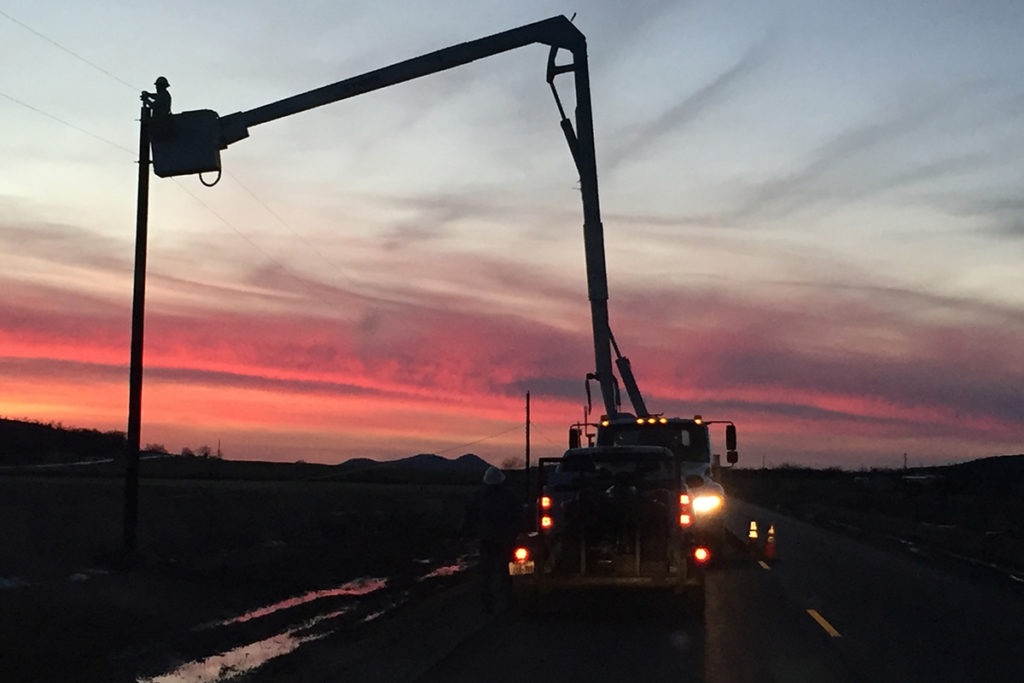
“What are the odds?” asked Shane Laws, CEO of Victory Electric Cooperative. “Out of 20,000 possible meters to have an outage, [you] get called out to the one house containing individuals quarantined because of the coronavirus.”
Less than 10 hours after public health officials in Ford County, Kansas, publicized their first confirmed case of COVID-19 exposure, two co-op lineworkers were standing just 15 feet away from the patient’s quarantined family.
It began with an early evening service call prompted by a noisy power outage affecting one unit of a condominium community served by the co-op. The lineworkers arrived and found no problems outside the home, so they approached the members in the doorway of their patio. That’s when the members warned them they were under mandatory quarantine.
“We couldn’t believe it,” one of the lineworkers told Jerri Whitley, the Dodge City-based co-op’s vice president of communications.
The “near-miss” incident prompted Victory EC managers to re-examine the co-op’s policies as they confront challenges from the ongoing pandemic.
“This situation proves you just never know what might happen,” said Mikey Goddard, Victory EC’s vice president of safety. “The job of a lineman is dangerous enough, and in these times of uncertainty, we need to focus on safety and take precautions to protect our employees.”
He said the co-op has reviewed procedures with its after-hours dispatch service to ensure vital information is relayed to crews.
“Communication is key! Talk to your teams and employees,” Goddard said.
Many other distribution co-ops are taking similar distancing precautions, encouraging online and telephone payment and expanding drive-through and kiosk payment services.
“This is a fluid situation, and we recognize that many businesses, individuals and families may be impacted by these unprecedented events,” said Rita Alexander, vice president of human resources and member services at Gibson Electric Membership Corp. in Trenton, Tennessee.
As jobs are lost and entire industries suspend operations, many co-ops are encouraging members to call in if they have payment difficulties and suspending disconnections to help reduce financial hardships.
“It seems inevitable that some members will face financial challenges due to COVID-19,” said Kaua‘i Island Utility Cooperative President and CEO David Bissell. “We don’t want to add to that anxiety with potential loss of electric service.”
The Lihue, Hawaii-based distribution co-op has suspended service disconnections for 30 days, but bill payments have not been waived.
Co-ops also have adapted procedures to reduce risks to operations staff like line technicians and vegetation management personnel who still must respond to service disruptions.
“Pickup trucks have been rented so that servicemen who normally share a vehicle don’t have to share and possibly spread the virus to their counterparts,” said Mary Laurent, communications coordinator for Southwest Louisiana Electric Membership Corp. “Trucks are loaded and work is begun each day wherever possible from home instead of coming in to each warehouse.”
SLEMCO has also suspended cross-district work assignments and requires crews to obtain parts and equipment from their assigned district warehouse.
“If one crew falls ill, they can all be sent home, and another crew will take over their geographic area,” Laurent said.
Derrill Holly is a staff writer at NRECA.
Read more on the electric co-op response to the COVID-19 Pandemic
See NRECA’s COVID-19 hub on cooperative.com for key resources for co-ops, including guidance on business continuity planning and communication, as well as event schedule changes.